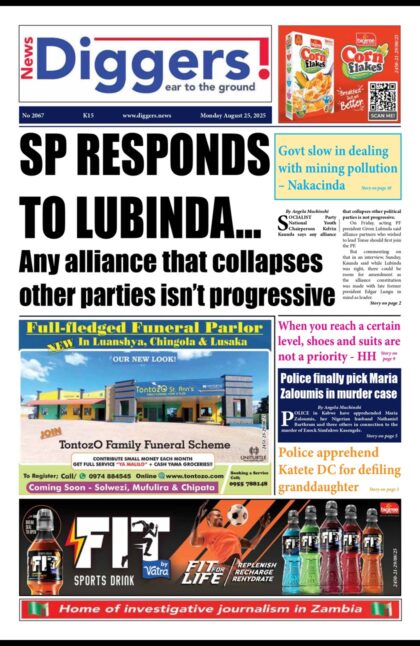Transport and Communications Minister Brian Mushimba says government does not know when employees at Tanzania Zambia Railways Company Limited (TAZARA) will be paid despite being aware that they have not been remunerated since August.
Mushimba was responding to Kapiri Mposhi UPND member of parliament Stanley Kakubo who wanted to know when government would pay TAZARA workers.
“Yes, Mr Speaker, government is aware that employees at TAZARA on the Zambian side, have not been paid their August and September salaries. Mr Speaker, you will recall that I had updated the House in April, 2018, on this matter. Due to financial challenges faced by TAZARA, the employees have not been paid their salaries. TAZARA has been unable to generate enough revenues to cover employees’ salaries for a while now, and government has been stepping in to help as much as possible. The reasons for this situation are many, and we have discussed them here. Mr Speaker, they include lack of capital investment into TAZARA by the two-shareholder governments for a period of time. Old and inadequate equipment, poor management of the institution, and these are matters that are receiving a lot of attention from this government and the Tanzanian government with various levels of success,” Mushimba narrated.
“Mr Speaker, you know tomorrow is not promised or guaranteed. I think only God knows what will happen tomorrow. None of us have that privilege. So, the conversation between myself and the management staff at TAZARA had been ongoing. They have made promises and like I said, May and June salaries were paid from internally-generated resources and the commitment is that they are looking for resources, they have engaged the unions, they are talking amongst themselves and in the soonest possible time they will make sure that the arrears are cleared. Mr Speaker, the situation at TAZARA, though still severe, has been improving over the last three or four years. When PF came in power, TAZARA had hit rock bottom with its worst performance of only being able to carry 88,000 metric tonnes of cargo against the break-even point of 600,000 metric tonnes. This performance, Mr Speaker, has over the last few years been improving and actually recorded remarkable improvement and as of June, 2018, an improvement of 151 per cent had been recorded.”
Mushimba said the volumes of cargo being moved is still below the break-even point of 600,000 metric tonnes, adding that the company still has limited resources to pay workers.
“After we signed the SI number 7 of 2018, which asked for 30 per cent of the heavy and bulky cargo to move to railway, an additional 17 per cent improvement had been recorded since that signing of the SI. However, the volumes of cargo being moved is still below break-even pint of 600,000 metric tonnes. TAZARA needs more rolling stock. The business is there once more rolling stock is deployed. They have recently entered into agreements with a private sector player called Calabash to put more rolling stock on the rail tracks, and they have also remanufactured several old rolling stocks that have been put back into life. I had the privilege to commission recently in Kapiri Mposhi these newly-remanufactured locomotives using their own locally-generated resources and internal technical staff,” Mushimba explained.
“From the gross figures that we see, Mr Speaker, we feel the environment is enabling enough. The new policy directives and the new SI signed, the new management that had been put in place, we are confident that TAZARA will continue returning around and soon, they will be able to pay salaries in time. Government’s aware of the potential threat by workers to withdraw their labour due to non-payment of their August and September, 2018 salaries.”
He said management at TAZARA was, however, working toward finding a lasting solution to address the problem.
“However, TAZARA management is working towards finding a lasting solution to improve operations and generate more revenues through the addition of rolling stock and also other revenue-generating initiatives with the private sector that they have embarked on in the last year and a half. TAZARA management managed to pay May and June, 2018, salaries from their own resources that they generated. This trend we expect and as government, we will support,” said Mushimba.
“With the efforts management is making to address the salary issues, especially having shown commitment by paying May and June salaries, we expect the issue of employees threatening to withdraw labour not to come to fruition because we expect TAZARA to find the resources very soon as clear these arrears. Mr Speaker, as soon as TAZARA generates resources through their traditional revenue stream, and the additional streams that they are bringing on board, these workers will be paid.”























